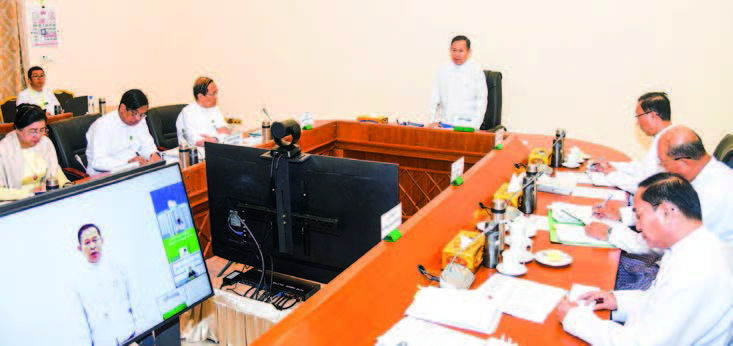WHEN submitting the Budget Estimate and Revised Estimate, the Union-level organizations and ministries should carefully assess and verify the actual needs before making their submissions, said Vice-Senior General Soe Win.
Vice-Chairman of State Administration Council Deputy Prime Minister Vice-Senior General Soe Win said so at the coordination meeting on reviewing revenue and expenditure estimates of the Union for the 2025-2026 financial year held in Nay Pyi Taw yesterday.
Speaking at the meeting, the Vice-Senior General, who is also Vice-Chairman of the Financial Commission, said in drafting the annual budget estimates for each financial year, the government has to ensure that the budget deficit and GDP do not exceed five per cent. When reviewing the budget estimates for the 2024-2025 financial year, it is observed that certain revenue-generating ministries and organizations have not been able to reach their revenue targets due to various reasons. Similarly, on the expenditure side, there have been cases where unnecessary and excessive budget requests were submitted, as well as requests for projects that were presumed to be completed. Moreover, some projects are not completed, and certain operations fail to commence as planned due to various reasons by the end of the financial year. As a result, surplus funds are returned, leading to a significant amount of surplus funds for the State.
He continued that GDP is calculated based on both revenue and expenditure and when comparing the budget deficit to the GDP ratio, unspent funds can lead to a reduction in GDP. Moreover, when the ministries that need to use the funds can utilize the allocated funds on time, projects and operations can be completed, contributing to the growth of their respective ministries’ GDP.
It is the most important issue. In this regard, the Head of the State instructed that “ it is essential to carefully utilize the budget. There are budget requests that are unnecessary, unfeasible and unrealistic. If the requests are reviewed before submitting, the initial budget estimate could be significantly reduced.” Therefore, the ministries and Union organizations are urged to analyze depending on the essential and non-essential projects before submitting the budget proposals.
In allocating the revenue, the newly established Industrial Development Commission, Electricity and Energy Development Commission and Agriculture and Livestock Development Commission will have to work with the ministries for economic development. Therefore, the expenditure is likely to be increased. On the other hand, if the unspent funds that are not needed are allocated to the commission and its relevant ministries, it will show significant GDP growth. When the GDP improves, there will also be an increase in revenue. Therefore, when submitting the Budget Estimate and Revised Estimate, the Union-level organizations and ministries should carefully assess and verify the actual needs before making their submissions.
According to the findings of the pre-scrutiny committee and officials, the initial submissions by the ministries indicated GDP with a budget deficit at 7.04 per cent. When the two departments and three committees under the Ministry of Planning and Finance scrutinized that ratio, it revealed GDP with a budget deficit of 6.56 per cent. Then, the deputy minister found 5.85 per cent, and the Deputy Prime Minister and Union Minister for Planning and Finance scrutinized up to 5.24 per cent.
The pre-scrutiny committee chairman and focal ministries collectively reviewed and made adjustments to the necessary expenditure and estimated GDP based on the 2025-2026 financial year budget estimate. Based on the result, the GDP and budget deficit ratio are reduced to 4.74 per cent, and the amount not more than five per cent of the deficit and GDP can be allocated to the ministries related to three commissions and other essential sectors depending on the needed funds.
He continued that the expenditures also should be estimated for maintenance after natural disasters, social protection, education and health sectors. Preparations should be made when the pre-scrutiny committee completes the reviews, as there can be instructions by the Prime Minister for further projects aiming to promote the State economy.
Afterwards, Commission Secretary Union Minister U Win Shein, Deputy Minister U Min Htut and Union Auditor-General Dr Khin Naing Oo reported on their respective sectors. Those from Union-level organizations and Union ministries discussed financial matters. — MNA/KTZH


